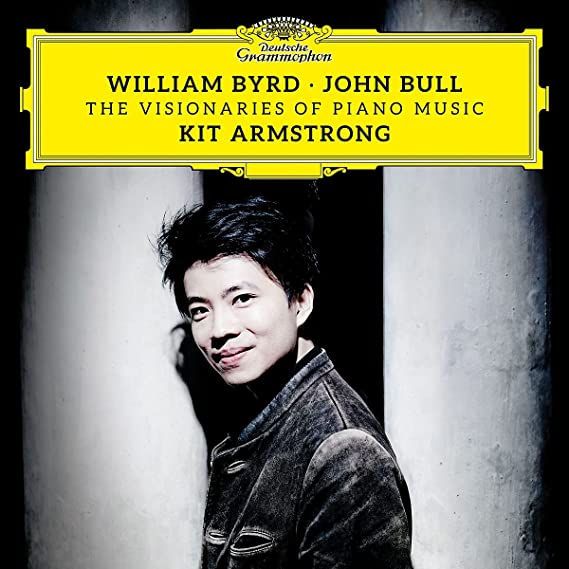Kit Armstrong: The Visionaries of Piano Music
View record and artist detailsRecord and Artist Details
Composer or Director: Kit Armstrong
Genre:
Instrumental
Label: Deutsche Grammophon
Magazine Review Date: 08/2021
Media Format: CD or Download
Media Runtime: 135
Mastering:
DDD
Catalogue Number: 486 0583

Tracks:
| Composition | Artist Credit |
|---|---|
| (Les) Buffons |
John Bull, Composer
Kit Armstrong, Composer |
| 12 Canons |
John Bull, Composer
Kit Armstrong, Composer |
| Fantasia on a Fugue of Sweelinck |
John Bull, Composer
Kit Armstrong, Composer |
| Walsingham |
John Bull, Composer
Kit Armstrong, Composer |
| Fantastic Pavane |
John Bull, Composer
Kit Armstrong, Composer |
| Fantastic Galliard |
John Bull, Composer
Kit Armstrong, Composer |
| Prelude |
John Bull, Composer
Kit Armstrong, Composer |
| Fantasia |
John Bull, Composer
Kit Armstrong, Composer |
| My Grief |
John Bull, Composer
Kit Armstrong, Composer |
| Melancholy Pavan |
John Bull, Composer
Kit Armstrong, Composer |
| Prelude and Carol, ‘Laet ons met herten reijne' |
John Bull, Composer
Kit Armstrong, Composer |
| Chromatic Pavane (Queen Elizabeth's) |
John Bull, Composer
Kit Armstrong, Composer |
| Telluris ingens conditor |
John Bull, Composer
Kit Armstrong, Composer |
| (The) Battle, Movement: The flute and the drum |
William Byrd, Composer
Kit Armstrong, Composer |
| John come kiss me now |
William Byrd, Composer
Kit Armstrong, Composer |
| The Maiden’s Song |
William Byrd, Composer
Kit Armstrong, Composer |
| Sellinger's Round |
William Byrd, Composer
Kit Armstrong, Composer |
| O mistress mine I must |
William Byrd, Composer
Kit Armstrong, Composer |
| (The) Woods so wild |
William Byrd, Composer
Kit Armstrong, Composer |
| The Bells |
William Byrd, Composer
Kit Armstrong, Composer |
| Ut , re, mi, fa, sol, la |
William Byrd, Composer
Kit Armstrong, Composer |
| Ut, mi, re |
William Byrd, Composer
Kit Armstrong, Composer |
| The Earl of Oxford’s March |
William Byrd, Composer
Kit Armstrong, Composer |
| Parthenia, Movement: No 1, Prelude |
William Byrd, Composer
Kit Armstrong, Composer |
| Parthenia, Movement: No 2, Pavan ‘Sir William Petre’ |
William Byrd, Composer
Kit Armstrong, Composer |
| Parthenia, Movement: No 3, Galliard |
William Byrd, Composer
Kit Armstrong, Composer |
| Parthenia, Movement: No 6, Pavan, ‘The Earl of Salisbury’ |
William Byrd, Composer
Kit Armstrong, Composer |
| Parthenia, Movement: No 7, Galliard |
William Byrd, Composer
Kit Armstrong, Composer |
| Parthenia, Movement: No 8, Galliard, ‘Mistress Mary Brownlow’ |
William Byrd, Composer
Kit Armstrong, Composer |
| The Second Ground |
William Byrd, Composer
Kit Armstrong, Composer |
Author: Philip Kennicott
In a cogent and provocative essay introducing his recording of works by William Byrd and John Bull, pianist Kit Armstrong takes issue with a common fallacy of music history: we have a tendency to think that musical complexity has only increased over time and thus the past is always somehow simpler. Nonsense, he says, citing the two composers he champions here on an album subtitled ‘The Visionaries of Piano Music’. In these works, the keyboardist must master running thirds in the left hand, and complex division and subdivision of the lines, to consider only two technical challenges. Perhaps even more taxing is the intellectual challenge of this music, which can easily sound merely intellectual if performed without fantasy and imagination.
Armstrong brings abundant quantities of both to his entirely satisfying rendering of the sometimes austere and eccentric Bull and the amiable and elegant Byrd on the modern piano. Glenn Gould, in another enormously appealing account of some of this repertoire, called forth a sweetly percussive but rather uniform palette, likely his homage to the harpsichord or virginals. Armstrong finds a much wider range of sonority and colour, as broad as any pianist can elicit from the piano. And while there is no lack of contrapuntal clarity in Armstrong’s reading, he is after a different sense of complexity than Gould evoked. Variations of touch and dynamics guide the ear through the multiple voices in these works, but the intent is more about drama and narrative than a sonic X-ray of the score.
Indeed, Armstrong finds episodes, entr’actes and telling vignettes in music that is too often performed as a kind of relentless accumulation of mere notes and forward-driving energy. There is push and pull here, and even moments of suspended ennui. The tempos are sensible and the ornamentation is clear and lean. And while it’s tempting to suggest that these are 19th-century readings projecting a romantic sensibility back on to music that is some 400 years old, it makes more sense to see this as an essentially 21st-century account. The historic perspective is broad, the stylistic understanding keen. But the freedom is maximal, which makes for a transformative view of this magisterial music.
Discover the world's largest classical music catalogue with Presto Music.

Gramophone Digital Club
- Digital Edition
- Digital Archive
- Reviews Database
- Full website access
From £8.75 / month
Subscribe
Gramophone Full Club
- Print Edition
- Digital Edition
- Digital Archive
- Reviews Database
- Full website access
From £11.00 / month
Subscribe
If you are a library, university or other organisation that would be interested in an institutional subscription to Gramophone please click here for further information.




